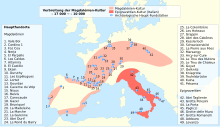Magdalenian
 |
|
| Geographical range | Western Europe |
|---|---|
| Period | Upper Paleolithic |
| Dates | c. 17,000 – c. 12,000 BP |
| Type site | Abri de la Madeleine |
| Major sites | Cave of Altamira, Kents Cavern, Lascaux |
| Preceded by | Solutrean |
| Followed by | Azilian, Ahrensburg culture |
| The Paleolithic |
|---|
|
↑ Pliocene (before Homo) |
|
Lower Paleolithic (c. 3.3 Ma – 300 ka)
(300–45 ka)
(50–10 ka)
|
| ↓ Mesolithic ↓ Stone Age |
↑ Pliocene (before Homo)
The Magdalenian (also Madelenian; French: Magdalénien) refers to one of the later cultures of the Upper Paleolithic in western Europe, dating from around 17,000 to 12,000 years ago. It is named after the type site of La Madeleine, a rock shelter located in the Vézère valley, commune of Tursac, in the Dordogne department of France.
Originally termed L'âge du renne (the Age of the Reindeer) by Édouard Lartet and Henry Christy, the first systematic excavators of the type site, in their publication of 1875, the Magdalenian is synonymous in many people's minds with reindeer hunters, although Magdalenian sites also contain extensive evidence for the hunting of red deer, horses, and other large mammals present in Europe toward the end of the last ice age. The culture was geographically widespread, and later Magdalenian sites have been found from Portugal in the west to Poland in the east. It is the third epoch of Gabriel de Mortillet's cave chronology system, corresponding roughly to the .
The Magdalenian epoch was a long one, represented by numerous stations, whose contents show progress in the arts and general culture. It was characterized by a cold and dry climate, the existence of humans in association with the reindeer, and the extinction of the mammoth. The use of bone and ivory for various implements, already begun in the preceding Solutrian epoch, was much increased, and the period is essentially a Bone age. The bone instruments are quite varied: spear-points; harpoon-heads, borers, hooks and needles.
...
Wikipedia
